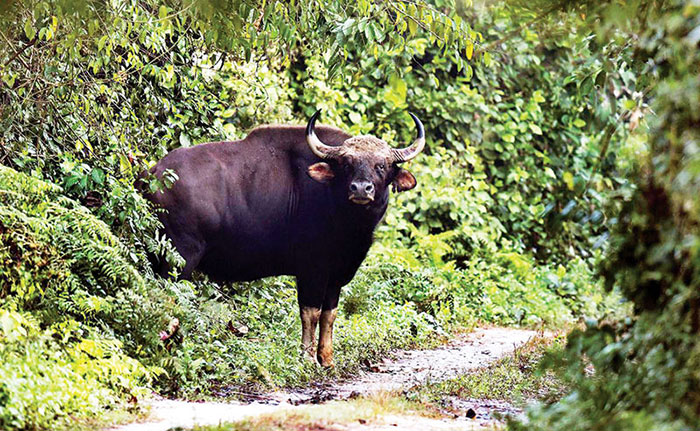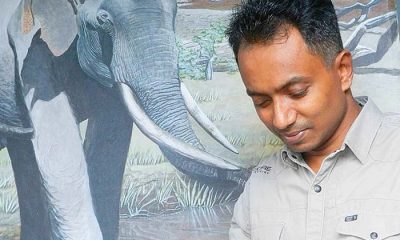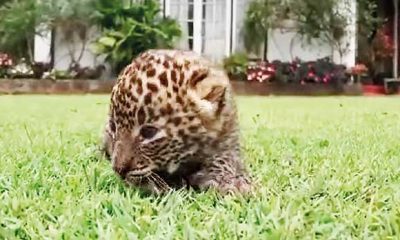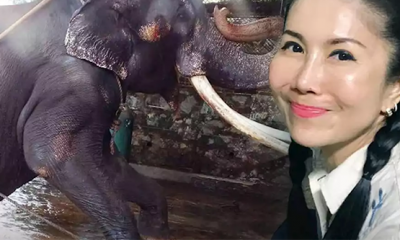News
Colombo asks India to send six bisons to reintroduce them in Lanka after 3 centuries

As wildlife diplomacy takes wing, government considers Lankan proposal for translocating gaurs
By Suhasini Haidar
and Jacob Koshy
New Delhi October 15, 2022: Close on the heels of the project that translocated cheetahs from Namibia, the Indian government is considering a proposal from Colombo to export a number of gaurs, or Indian bisons, to Sri Lanka to revive the population of gavaras that have been extinct in the island since the end of the 17th century. If the project is cleared, it would be the first such agreement between India and Sri Lanka, and part of a global trend of “wildlife or zoological diplomacy”, say experts.
Sources said the Ministry of External Affairs (MEA), which received the request in August, has now forwarded it to the Ministry of Environment and Forests (MoEF), “seeking comments” on the proposal to transport at least six specimens, including a bull and three to five cows. According to the written proposal, the Sri Lankan Department of Zoological Gardens would then carry out “captive breeding a herd of about a dozen specimens over a five-year period before trial reintroduction to the wild could take place in accordance with [internationally mandated] guidelines for reintroductions”.
S.P. Yadav, Director, National Tiger Conservation Authority, said the proposal was being studied. “We’ll have to evaluate if the conditions for translocation are right, such that the animal can sustainably thrive over there,” he told The Hindu, estimating the evaluation could take a few months.The suggestion for the proposal came from world-renowned Sri Lankan conservationist Rohan Pethiyagoda, who was awarded the Linnean medal 2022 (U.K. -based equivalent of the Nobel prize for zoology) for his work on restoring fresh water and forest biodiversity.
“As a scientific and cultural collaboration between our two countries, I felt this could be an immensely valuable initiative. But I know it is fraught with difficulties,” said Sri Lankan High Commissioner to India Milinda Moragoda who handed over the preliminary request on the basis of Mr. Pethiyagoda’s suggestion. “India is without a doubt Sri Lanka’s closest friend, supporter and trading partner. We have a shared history, shared cultural identity, and shared gene. We even got Buddhism, on whose traditions we derive our national values, from India,” he added.
Experts say that while “zoological diplomacy” had been practised worldwide, they draw a distinction between “gifts or loans” of animals in captivity to translocation and reintroduction of a species, particularly between neighbouring countries with similar eco-systems. For example, American bison herds were supplemented with animals from Canada after the U.S. herds were almost all wiped out, The U.K. has recently introduced the European bison (Wisent) after an estimated 10,000 years in June 2022(its extinct relative the Steppe Bison was believed to have lived there many centuries ago).
Israel has for decades pursued reintroductions, including of Persian fallow deer. Arabian oryx and other species have been released into the Negev desert, and South Africa has recently used the export of cheetahs to other African countries as a diplomatic tool during the post-apartheid era. More recently, Cambodia has requested translocating tigers from India, which is under consideration.
“Much depends on whether the conditions that caused the extinction have been removed, but reintroduction is known and has frequently been taken up between countries where the range is contiguous,” explained Mahesh Rangaran, Professor of History and Environmental Studies at Ashoka University who has studied conservation history, including such attempts. “In that sense, the animal plays a role as a zoological ambassador between nation states,” he added.
Sri Lankan officials say the gaur, called the gavara in Sinhala, was once widespread and archaeological remains in ancient caves in the island included the remains of the animal. By the end of the 17th century, however, the species appears to have been extirpated in Sri Lanka, although they remain prominent in iconography and mythological stories.The Indian gaur, a reclusive beast that lives in the wild, is the largest wild bovine that is a protected species and included in Schedule I of the Wild Life Protection Act, 1972 and listed as vulnerable in the International Union for Conservation of Nature (IUCN) Red List. There are about 13,000 to 30,000 gaurs in the world with approximately 85% of the population present in India. It is also found in Burma and Thailand.
The first-ever population estimation exercise of the Indian gaur carried out in the Nilgiris Forest Division in February 2020 estimated around 2,000 Indian gaurs to be inhabiting the division. This came after instances of people being attacked or injured by the bison primarily in and around plantations came to light. In 2019, for which the most recent numbers are available, three people were killed and seven injured in attacks by gaurs.
(The Hindu)
Latest News
“School Nutrition Programme’’to continue, without interruption

The Secretary to the President, Dr. Nandika Sanath Kumanayake stated that the government has taken a policy decision to continue, without interruption, “School Nutrition Programme’’ aimed at reducing anemia among schoolchildren, which is being implemented with the assistance of the World Food Programme.
He made these remarks on Wednesday (23), during a discussion held at the Presidential Secretariat with representatives from relevant Ministries and government institutions involved in the programme, along with officials from the World Food Programme, the Bill and Melinda Gates Foundation and the Pathfinder Foundation.
The school meal programme, aligned with the government’s initiative to provide nutritious lunch to primary school students in districts identified as having high levels of malnutrition, specifically targets the reduction of iron deficiency among schoolchildren. The initiative is jointly coordinated by the Ministry of Education, Higher Education and Vocational Education, the Ministry of Health and Mass Media, Provincial Councils, the Food Promotion Board and the Partnership Secretariat for the World Food Programme Cooperation. The government has allocated Rs. 32 billion for this programme for the current year.
A pilot project is currently being implemented in four selected districts. Based on a formal health and nutrition study assessing the outcomes of this pilot project, there are plans to expand the programme island-wide. The study aims to determine the extent to which iron deficiency among schoolchildren can be reduced through this initiative.
As part of the programme, fortified rice enriched with iron and folic acid will be included in the school meals to specifically address anemia among students.
The World Food Programme, the Bill and Melinda Gates Foundation, the Gateway Foundation and the Pathfinder Foundation have pledged their continued support for this effort.
Present at the occasion were Secretary to the Prime Minister Pradeep Saputhanthri, Senior Additional Secretary to the President Kapila Janaka Bandara, Secretary to the Ministry of Education Nalaka Kaluwewa, Secretary to the Ministry of Health and Mass Media Dr. Anil Jasinghe, and Secretary to the Ministry of Rural Development, Social Security and Community Empowerment Malarmathy Gangatharan, along with other government officials and representatives from partner organizations.
[PMD]
Latest News
Heat index at ‘Caution level’ at some places in Northern, North-central and Eastern provinces and Monaragala, Hambantota districts

Warm Weather Advisory
Issued by the Natural Hazards Early Warning Centre of the Department of Meteorology at 3.30 p.m. 23 April 2025, valid for 24 April 2025
The public are warned that the Heat index, the temperature felt on human body is likely to increase up to ‘Caution level’ at some places in Northern, North-central and Eastern provinces and Monaragala, Hambantota districts
The Heat Index Forecast is calculated by using relative humidity and maximum temperature and this is the condition that is felt on your body. This is not the forecast of maximum temperature. It is generated by the Department of Meteorology for the next day period and prepared by using global numerical weather prediction model data.

Effect of the heat index on human body is mentioned in the above table and it is prepared on the advice of the Ministry of Health and Indigenous Medical Services.
ACTION REQUIRED
Job sites: Stay hydrated and takes breaks in the shade as often as possible.
Indoors: Check up on the elderly and the sick.
Vehicles: Never leave children unattended.
Outdoors: Limit strenuous outdoor activities, find shade and stay hydrated. Dress: Wear lightweight and white or light-colored clothing.
Note:
In addition, please refer to advisories issued by the Disaster Preparedness & Response Division, Ministry of Health in this regard as well. For further clarifications please contact 011-7446491.
News
Shani appointed to committee studying PCoI report on Easter Sunday terror attacks

Retired SSP Shani Abeysekera, serving the Police Department again, has been appointed to the committee headed by Senior DIG Asanka Karawita, tasked with studying the Presidential Commission of Inquiry (PCoI) report on the 2019 Easter Sunday carnage.
The other members of the team are DIG, CID, Director, CID and Director Terrorism Investigation Division (TID)
Pivithuru Hela Urumaya (PHU) leader Udaya Gammanpila yesterday said that Abeysekera had been one of the law enforcement officers whose conduct raised eyebrows over the years as regards the failure on the part of the CID to thwart the Easter Sunday attacks.
The National Police Commission approved the reappointment of SSP Abeysekera on contractual basis for one year, with effect from 10 Oct., 2024.
Abeysekera backed Anura Kumara Dissanayake’s presidential election campaign as a member of the retired police collective.
-

 Business5 days ago
Business5 days agoDIMO pioneers major fleet expansion with Tata SIGNA Prime Movers for ILM
-

 News4 days ago
News4 days agoFamily discovers rare species thought to be extinct for over a century in home garden
-

 Features6 days ago
Features6 days agoProf. Lal Tennekoon: An illustrious but utterly unpretentious and much -loved academic
-

 Foreign News5 days ago
Foreign News5 days agoChina races robots against humans in Beijing half marathon
-

 Editorial5 days ago
Editorial5 days agoSelective use of PTA
-

 Features2 days ago
Features2 days agoRuGoesWild: Taking science into the wild — and into the hearts of Sri Lankans
-

 News2 days ago
News2 days agoOrders under the provisions of the Prevention of Corruptions Act No. 9 of 2023 for concurrence of parliament
-

 Features4 days ago
Features4 days agoThe ironies of history
























